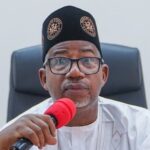If all goes well, Dr Ngozi Okonjo-Iweala will be announced as the next Director-General of the World Trade Organization (WTO) by early November as the third and final step of the selection process gets underway this week.
By convention, Nigeria and South Korea will be informed of the outcome before everyone else. Her appointment will be an important diplomatic milestone for Nigeria on the world stage and will offer the Buhari government an immediate respite in a tumultuous fortnight.
- WTO: We’ll continue to push until you win, Buhari assures Okonjo-Iweala
- Okonjo-Iweala on the cusps of history
But only if all goes well. So what is going well now for Nigeria’s candidate, and more significantly, what could go wrong? This is a difficult question for us in Nigeria, but it is still an important one that we must ask because in politics, and this is politics at the highest level, all seldom goes well. Approaching this question, therefore, requires first understanding the politics of appointing a WTO Director-General.
According to Procedures for the Appointment of Directors-General, the organisation’s rulebook for selecting its leaders in use since 2002, “the overriding objective of Members in this process shall be to reach decisions by consensus”. This means that WTO DGs shall be appointed by consensus, or failing that, by-election as a last resort.
Consensus politics has a positive ring to it and always appears benign, gentlemanly and conciliatory. But in the real world, it is just as intensely political as electoral politics. In effect, consensus politics simply means the influence of those who have it, and the acquiescence of those who do not. This is particularly true for the high-water politics of international trade. So while the organisation’s 160 member countries presumably have a say in this selection process, the influence of the United States, China and the European Union will loom large above all.
The first thing Dr Okonjo-Iweala (NOI) has going for her is herself. To the extent that a person can be qualified for a job they have not held before, she is eminently qualified indeed. In terms of global name recognition and stature, NOI towers above her South Korean rival by a country mile. Furthermore, Dr NOI’s career and experience cuts across government, international development and the corporate world, the three key constituents a WTO Director-General must deal with, unlike her rival whose experience has been predominantly in government.
But the rival candidate has her own strengths too. Mrs Yoo Myung-Hee holds a Juris Doctor, the professional equivalent of a doctorate in law from Vanderbilt University, also a top U.S school. Moreover, unlike Dr NOI whose main forte is in development economics, Myung-Hee is her country’s Minister for Trade, and in her 25-year experience in international trade, she has negotiated trade deals with the United States, China and several EU countries; the most influential power blocks in the WTO.
In terms of personal qualification and experience, then I would say that the two candidates square up, but with a slight edge for Dr Okonjo-Iweala. As an African woman, she also has an edge. While an Asian, a Thai, has held the position before, no African person has ever done so. Section 13 of the rulebook provides that where two or more candidates are equally meritorious, Members “shall take into consideration as one of the factors the desirability of reflecting the diversity of the WTO’s membership in successive appointments to the post of Director-General”.
Indeed, of the eight candidates nominated in the first round, and of the five who made it to the second round, three were Africans. So if African governments can persuade their peers that this round of WTO leadership is our ‘turn’, regional diversity should count strongly in Dr NOI’s favour. But there is a small caveat to this. The World Trade Organization sees world regions in developmental, rather than geographic terms. So, Thailand, Nigeria and Brazil (the country of the immediate past DG) may in fact be classed in the same category as developing countries, regardless of their very wide geographic diversity.
There is an even bigger caveat elsewhere in this selection process, however. As I have already noted, consensus politics is influence peddling by another name. It is an arena of politics where those who have effective power wield it to achieve desired ends, and where those who don’t trade their lack of power for other advantages. So for Nigeria’s candidacy, two things are of particular significance here.
Africa’s 42 members constitute about 27 percent and 35 percent of the total and developing country membership, respectively, in the WTO. Yet, most African countries have limited influence to insist on a choice of their own or resist the choice of more powerful members. The US, China and the EU could easily sway the choice of many African countries by using the promise or threat of aid and trade behind the scenes. A beggar, as they say, has little choice. Moreover, African countries have limited trade with each other, which means little incentive to stick together.
This is where something could go wrong for Nigeria and Dr Okonjo-Iweala because such behind the scenes politics is made easier by WTO’s leadership selection rulebook which guarantees strict confidentiality for the choices each member makes. So if any African country sells out to the US or China, Nigeria will never know, and what can we do even if we knew? Nigeria’s influence in Africa has never been lower than it is today. The prospect of appointing Dr NOI to this position is, therefore, both a test of our influence and an opportunity to improve that influence. It must not be missed.

 Join Daily Trust WhatsApp Community For Quick Access To News and Happenings Around You.
Join Daily Trust WhatsApp Community For Quick Access To News and Happenings Around You.

